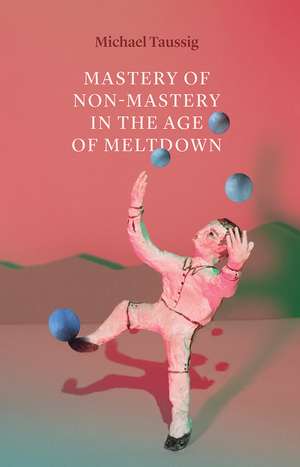Mastery of Non-Mastery in the Age of Meltdown
Autor Michael Taussigen Limba Engleză Paperback – 15 iul 2020
Taussig seeks to move us away from the manipulation of nature and reorient us to different metaphors and sources of inspiration to develop a new ethical stance toward the world. His ultimate goal is to undo his readers’ sense of control and engender what he calls “mastery of non-mastery.” This unique book developed out of Taussig’s work with peasant agriculture and his artistic practice, which brings performance art together with aspects of ritual. Through immersive meditations on Walter Benjamin, D. H. Lawrence, Emerson, Bataille, and Proust, Taussig grapples with the possibility of collapse and with the responsibility we bear for it.
Preț: 184.09 lei
Nou
Puncte Express: 276
Preț estimativ în valută:
35.24€ • 36.24$ • 29.24£
35.24€ • 36.24$ • 29.24£
Carte disponibilă
Livrare economică 29 ianuarie-12 februarie
Livrare express 14-18 ianuarie pentru 21.70 lei
Preluare comenzi: 021 569.72.76
Specificații
ISBN-13: 9780226698670
ISBN-10: 022669867X
Pagini: 192
Ilustrații: 5 halftones
Dimensiuni: 140 x 216 x 18 mm
Greutate: 0.31 kg
Ediția:First Edition
Editura: University of Chicago Press
Colecția University of Chicago Press
ISBN-10: 022669867X
Pagini: 192
Ilustrații: 5 halftones
Dimensiuni: 140 x 216 x 18 mm
Greutate: 0.31 kg
Ediția:First Edition
Editura: University of Chicago Press
Colecția University of Chicago Press
Notă biografică
Michael Taussig is the Class of 1933 Professor of Anthropology at Columbia University. He is the author of several books, including The Corn Wolf, Beauty and the Beast, and Palma Africana, all published by the University of Chicago Press.
Recenzii
“Anthropologists (and those in allied disciplines) know Taussig as a stylistic innovator.”—Times Literary Supplement
“Above all, he is interested in individual stories and experiences, unique tales that cannot be reduced to rational explanation or bland report. . . . At the center of Taussig’s method is the anthropologist’s desire to bear witness to what he cannot understand.”—Los Angeles Review of Books
“One of the most accomplished writers that anthropology has produced.”—Choice
“Iconoclastic, experimental, and poetic, refusing ‘theory’ even as he makes it do his work.”—Hugh Raffles, The New School
“[This is] what anthropology is for: the art or science that shows fish the water. Taussig is renowned as one of its dizziest dialectical conjurors.”—Times Higher Education
“ [Taussig’s] late career unfolds with vitality, ingenuity, and surprises—with the storytelling voice, finally, of a Marlowe.”—George Marcus, University of California, Irvine
“Above all, he is interested in individual stories and experiences, unique tales that cannot be reduced to rational explanation or bland report. . . . At the center of Taussig’s method is the anthropologist’s desire to bear witness to what he cannot understand.”—Los Angeles Review of Books
“One of the most accomplished writers that anthropology has produced.”—Choice
“Iconoclastic, experimental, and poetic, refusing ‘theory’ even as he makes it do his work.”—Hugh Raffles, The New School
“[This is] what anthropology is for: the art or science that shows fish the water. Taussig is renowned as one of its dizziest dialectical conjurors.”—Times Higher Education
“ [Taussig’s] late career unfolds with vitality, ingenuity, and surprises—with the storytelling voice, finally, of a Marlowe.”—George Marcus, University of California, Irvine
"In the nineteen chapters that make up the book, Taussig reflects on a world on the brink of collapse; a world which is based on a “new normal” marked by the 'fantastic power of catastrophe' and the non-existence of the ordinary... Taussig’s book helps one consider new paths for understanding our contemporary world and the various forms of violence, dominance and destruction that haunt us."
